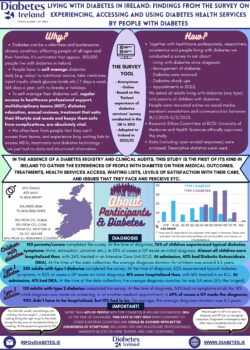LIVING WITH DIABETES, ACCESSING AND USING DIABETES SERVICES IN IRELAND
The findings from the Diabetes Ireland Survey
Diabetes can be a relentless condition, it’s all year round, 7 days a week, 24 hours a day. Regardless of the type of diabetes – it requires people to adapt their diabetes needs to their daily lifestyle. For most, this will include nutrition improvements and/or more physical activity, for others daily insulin dosing and blood glucose monitoring. For parents of children – special and additional care for their growing loved ones. As individuals, people with diabetes have to self-manage their condition on a day-to-day basis, but they also need regular healthcare professional support that empowers and teaches them how to live with diabetes well.
In Ireland, approximately 300,000 people live with diabetes and we often hear from the members of the diabetes community that access to diabetes health services is not the same in the various parts of the country, that the waiting lists to access diabetes education or diabetes technology, transition from paediatric to adult care, or to get an appointment with the specialist (podiatrist, dietitian) are long, and sometimes the services are not available at all (usually psychological support). From others, we hear that the services that they receive are excellent, timely, and of great quality, with no delays.
CLICK HERE TO SEE THE SUMMARY OF THE SURVEY FINDINGS
That’s why we decided to ask people living with diabetes (or their carers) about their experience of living daily with the condition in a more structured way and together with researchers and clinicians who are members of the Diabetes Ireland Research Alliance, and with the support from the RCSI University of Medicine and Health Sciences, we conducted an online survey on accessing diabetes services in Ireland in 2022. We asked questions not only about diabetes teams, waiting lists, education, annual reviews etc., but also about their diabetes diagnosis, treatments, complications, comorbidities, education and confidence with managing diabetes and many, many more. Some sections of the survey were eligible for every respondent, and some sections were specific, e.g. asking about daily glucose monitoring or insulin pump use.
Summary of Survey Findings
After three weeks of data collection (January/February 2023), detailed and comprehensive data analysis took place followed by discussions with the research team regarding the most important findings. The final report has been written (available upon request). Overall, 517 people completed the survey: 230 were adults with type 1 diabetes, 155 adults with type 2 diabetes, 120 responses were from parents of children with diabetes, and 12 had other types of diabetes. The majority of the respondents were from Co. Dublin (31%), followed by Co. Cork, Wexford and Kildare. All 26 counties were represented. Among the most important findings:
- Of adult respondents, 37% have diabetes-related complications or comorbidities, most commonly these were hypertension (high blood pressure – 23%), diabetes retinopathy (23%), hypothyroidism (17%) and mental health-related issues (14%).
- In their lifespan with diabetes, adults & children living with type 1 diabetes had experienced severe complications: 40% had experienced Diabetes Ketoacidosis (DKA) – a life-threatening complication caused by the lack of insulin. They experienced it mainly at the time of diagnosis – which should be avoidable if diabetes symptoms were recognised early. 45% of adults experienced at least one episode of severe hypoglycaemia, which requires another person’s intervention. Severe hypoglycaemia happened to 10% of children. Both events usually require hospitalisation.
- Generally, people rate their own health and well-being as being good or excellent, but one-third of respondents assess it as fair, poor or very poor.
- Mental health and well-being are rarely discussed as part of adult diabetes care, although > 45% of adults would like to discuss it with their teams.
- Use of technology is common in people with type 1 diabetes: up to 80% use Continuous Glucose Monitoring (CGM), either stand-alone or as part of an insulin delivery system. One-third of adults are on insulin pumps or automated insulin delivery systems, compared to more than half of children.
- In 2022, more than 90% of respondents had their HbA1c checked but not all other recommended annual checks were completed, with the highest rates for blood pressure, cholesterol levels and eyes.
- In the post-COVID era, the majority had at least one face-to-face appointment and most were seen two times during the year. 16% of adults had no face-to-face appointment, including 13% who had no diabetes appointment at all.
- All children had face-to-face appointments in 2022, with the majority of them (67%) having three or more.
- 88% had Long-Term Illness Scheme cover.
- Among those with type 2 diabetes, fewer than half have medical or GP visit cards and almost half (46%) pay privately to access diabetes care. One-fifth of adults with type 1 diabetes pay privately.
- Almost half of people with type 1 diabetes travel for more than 25km to access their main diabetes provider. They are usually based outside of Dublin.
- People are usually happy with the care provided but assess it “as rushed”. They acknowledge the under-resourcing as the main reason for waiting lists, perceived lack of support or dissatisfaction.
- There were some differences between people living in Dublin and those living in other counties. For example, among adults with type 1 diabetes, those from other places than Dublin have more often been diagnosed with diabetes complications or comorbidities (41% vs. 35%) or had to pay privately for their diabetes care (19% vs. 10%). The levels of technology uptake (CGM, insulin pumps) remained similar.
- Among people with type 2 diabetes, those from other counties than Dublin more often had diabetes complications or comorbidities (48% vs. 15%), mainly hypertension (40% vs. 18%) and mental-health related (24% vs. 12%). Those from outside of Dublin were usually receiving their care in general practices (75% vs. 55%). People from Dublin more often were treated in outpatient diabetes clinics (27% vs. 20%) or attended diabetes clinics privately (13% vs. 5%).
CLICK HERE TO SEE THE SUMMARY OF THE SURVEY FINDINGS
In the absence of a diabetes registry and clinical audits, this survey explored the experiences of those living with diabetes and is the first of its kind data source about the access and use of diabetes services, which informs the key stakeholders and policy-makers about diabetes care and its gaps in Ireland. The survey findings were presented to healthcare professionals and Oireachtas Members. Based on the survey findings, our Pre-Budget Submission 2024 has been launched with one main request: to develop a 10-year National Diabetes Strategy. Click here to see more information.
SEE THE PRE-BUDGET SUBMISSION 2024
The full report with the survey findings is available upon request. Contact [email protected]
We would like to express our gratitude to all the study participants who found time to complete the survey and share their experiences. We would also like to thank the Diabetes Ireland Research Alliance and the RCSI: University of Medicine and Health Sciences for their guidance and support in the research process.
If you would like to support Diabetes Ireland and the diabetes community, take positive action by writing to your local politicians seeking their help in making improvements in diabetes care for us! Click here for more information.
To support our advocacy efforts in improving the health of people with diabetes in Ireland, join us and become a member today. It’s only with your support that we can continue to support our community in Ireland.



